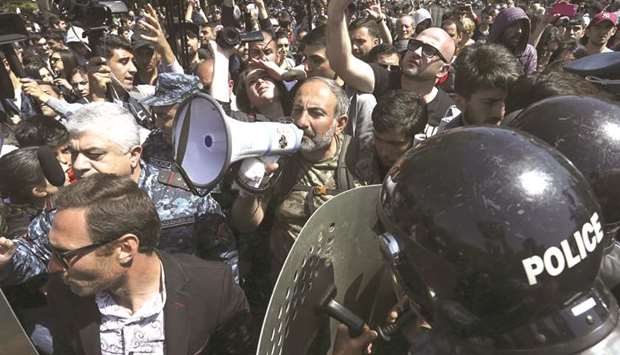Shouting “Armenia without Serzh”, protesters marched through central Yerevan and staged rallies across the city in opposition to the Kremlin-backed Sarkisian who was on Tuesday elected to the post of prime minister after a decade serving as president.
During a rally outside Yerevan State University opposition leader Nikol Pashinyan called on students to join the protests in the impoverished ex-Soviet nation.
“You are young people, you are not prisoners, go out and join us!” he said, calling for a new major rally yesterday evening.
Earlier in the day protesters sought to block one of Yerevan’s major thoroughfares and briefly massed outside Sarkisian’s residence.
“People are so angry, they can no longer stand Sarkisian’s rule,” a 26-year-old protester who only released his first name, Atom, told AFP. “The youth must stand up against Sarkisian’s regime.”
Authorities said that more than 70 demonstrators were detained and urged the protesters to disperse.
“We call on protest organisers to stop illegal actions,” the interior ministry said in a statement.
Protesters have held rallies over recent days to denounce a change in the political system that they say is a bid to ensure Sarkisian, 63, can remain in power under a new parliamentary system of government.
Constitutional amendments approved in 2015 has transferred governing powers from the presidency to the premier.
Parliament voted in Sarkisian as prime minister on Tuesday, sparking the largest protest in Armenia in years, with tens of thousands taking to the streets.
Russian President Vladimir Putin called Sarkisian late Tuesday to congratulate him on his election, the Kremlin spokesman said.
“We are watching the events that are unfolding in Armenia and — most importantly — hoping that everything will be within the legal framework,” said Putin’s spokesman Dmitry Peskov.
Sarkisian, a former military officer, has been in charge of the landlocked South Caucasus nation of 2.9mn people for a decade.
He also held the office of prime minister from 2007 to 2008.
The 42-year-old Pashinyan, who is the leader of the pro-Western Civil Contract opposition party, has called for “a peaceful velvet revolution” and urged his supporters to set up “revolutionary committees” across the country.
Political analysts said it was too early to call the protests the start of a revolution but warned that the authorities could lose control of the situation.
“The scale of protests proves that huge public anger has grown over the past few years,” political observer Stepan Safaian said.
“But the opposition lacks political resources to force Serzh Sarkisian to resign.”
Analyst Gela Vasadze agreed. “The overwhelming majority of the country’s population wants political change,” he told AFP. “The chances of the ongoing protests growing into a revolution are low, but in case the authorities fail to deliver on the people’s main demand — the demand for change — a revolution will not take long to arrive.”
The country’s new president, Armen Sarkisian, was sworn in last week but his powers will be weaker under the new system of government.
Even though the two men share the same surname, they are not related.
Protests began in Yerevan on Friday and have since spread to the country’s second and third largest cities, Gyumri and Vanadzor.
On Monday police used stun grenades against protesters who tried to break through a barbed wire cordon to get to the parliament building.
Authorities said 46 people, including six police and opposition leader Pashinyan, sought medical help.
After Sarkisian was first elected in 2008, 10 people died and hundreds were injured in bloody clashes between police and supporters of the defeated opposition candidate Levon Ter-Petrosyan.
Pashinyan was a member of Ter-Petrosyan’s election campaign.
Authorities at the time accused him of seeking to seize power and provoking mass riots.
He went into hiding but surrendered to the authorities in 2009.
He was released from jail in 2011 and elected to parliament the next year.

